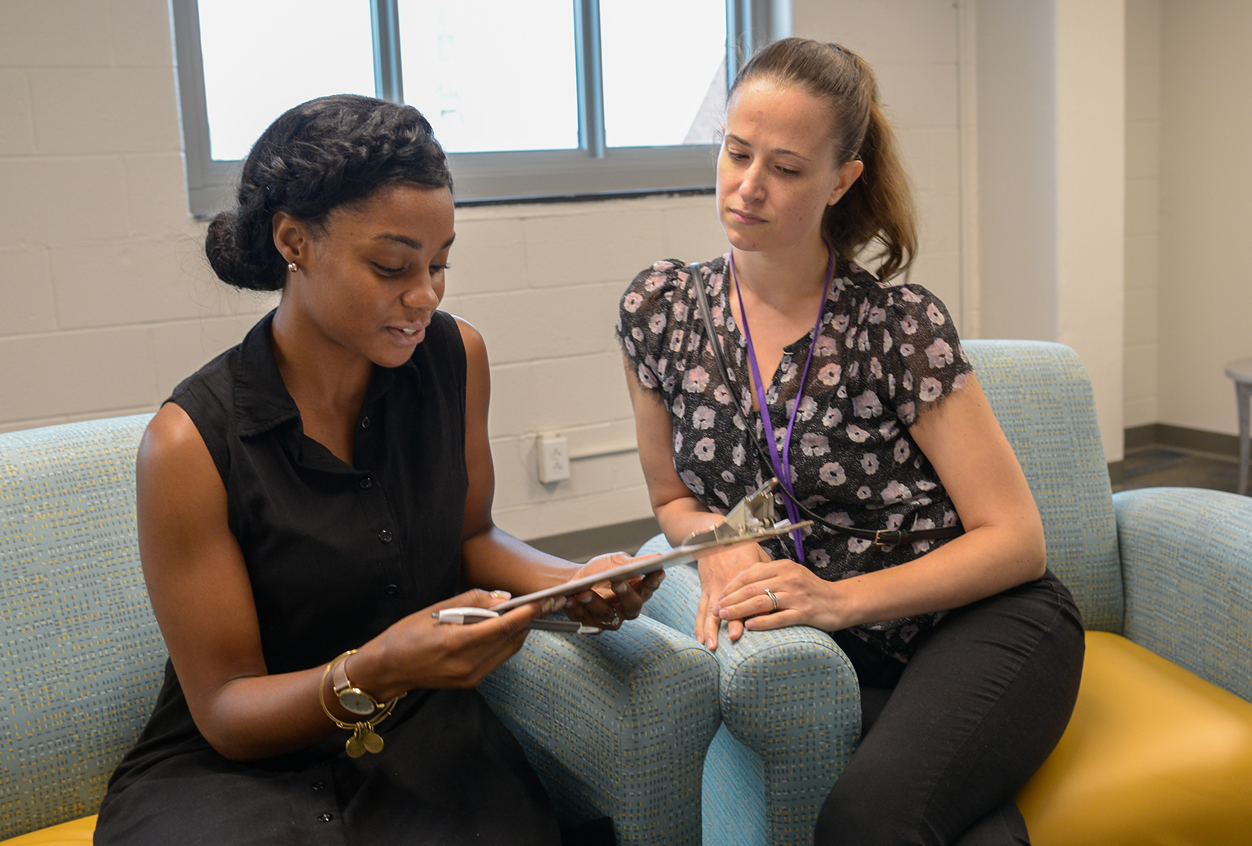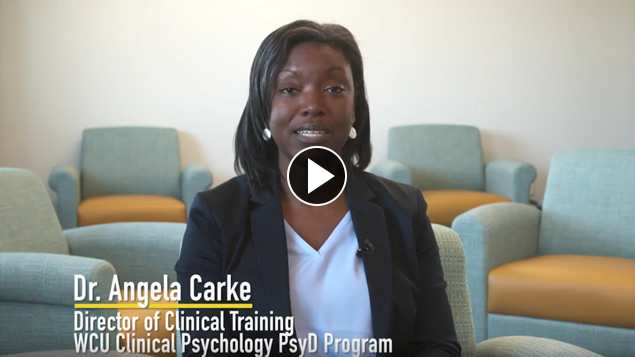WCU’s Doctor of Clinical Psychology Earns American Psychological Association Accreditation

With its newly earned accreditation from the American Psychological Association (APA), West Chester University’s Doctor of Psychology in Clinical Psychology (Psy.D.) program becomes one of only nine APA-accredited clinical psychology Psy.D. programs at a public university nationwide — making this among the most affordable accredited clinical Psy.D. programs in the United States. WCU’s program is also one of only two APA-accredited Psy.D. programs in clinical psychology offered at a public institution in Pennsylvania.
The inaugural cohort entered the full-time, five-year program in fall 2016 and will graduate in 2021.
The accreditation process encourages improvement through continuous self-study and review – and students are part of the program’s improvement plan.
Kenia Valdez, a third-year Psy.D. student, relates that, “Being in the second cohort, we were asked many times to give important feedback about policy and program development. Coming into the program, I was surprised how much our input was sought.”
Fellow third-year student Caroline Guzi agrees. “Professors are open to receiving feedback and making changes based upon our needs, interests, and learning styles, which I don't think is always the case, especially in more established programs.”
“We specialize in training clinicians versus researchers and provide more comprehensive training in a wide variety of clinical disorders compared to school psychology or traditional counseling programs,” says Vanessa Johnson, chair of the Psychology Department and core faculty member in the Psy.D. program. “We provide not just training in therapy, but also in diagnostic and psychoeducational testing. And our tuition price point is one of our advantages.”
Students can choose to specialize in trauma or child and adolescent mental health. Johnson says there is some overlap in coursework, i.e., students who choose the child and adolescent mental health track will receive some training in trauma and vice versa. All incoming first-year students are offered graduate assistantships. Cohorts are kept small so that students can benefit from their faculty mentors’ direct involvement. Currently, 30 students are enrolled.
“From their first semester, our students are in the clinic, which sets us apart from other clinical Psy.D. programs”
The University’s on-campus Community Mental Health Services (CMHS) clinic provides students with immediate access to clinical practice, and provides both the WCU community and the Chester County community with low-cost, cutting-edge psychotherapy and psychological testing. “From their first semester, our students are in the clinic, which sets us apart from other clinical Psy.D. programs,” notes Johnson. Students receive their first caseload in the spring of their first year, adds Angela Clarke, the program’s Director of Clinical Training. Caseloads are intentionally kept light and sessions are closely monitored by experienced, licensed psychologists through state-of-the-art supervision.
CMHS is a non-profit training and research facility located in the same building as the academic Psychology Department, whose faculty also employ it as a clinical research site.
More than 200 individuals and families have sought assistance and received treatment through CMHS since its inception in August 2017 and the diversity among CMHS clients offers Psy.D. students a broad range of experiences. Clients range in age from age 6 to 65, with 67% identifying as female, 31% as male, and 2% as transgender. Household income for the majority of clients is under $50,000, with 32% reporting under $20,000. Clients self-reported their ethnic/racial demographics as follows: 66% White, 17% Black, 8% Hispanic, 1% Asian, and 6% mixed race (remaining respondents chose not to answer).
As a bilingual student, Valdez provided therapy to some of the CMHS Spanish-speaking clients during year one and year two of the program.
Derrick Stahl values not only “the program’s multicultural emphasis in research and practice,” but also “clinical expertise that is cultivated from day one. The introduction to working with clients in psychotherapy is really one that is focused on engagement and presence with the client, rather than being overly objective or ‘cold.’ I believe this is the most valuable part of my training so far, and am really glad that that was how I was introduced to psychotherapy (though at the time it was especially nerve racking).” Stahl is a graduate research assistant with the Whole-Family Biopsychology Lab and
the Psy.D. program’s representative to WCU’s Graduate Student Association.
Students also conduct outreach, reports Clarke, through school and community health fairs in the region, with Community Volunteers in Medicine, and with ongoing group therapy sessions at an area high school.
Fourth- and fifth-year students conduct their clinical training in off-campus advanced practicum placements, or externships, throughout the region while also completing other coursework on campus. The fifth year is dedicated exclusively to a full-time pre-doctoral clinical internship.
Professor Deanne Zotter coordinates the advanced clinical practicum for the program. Until recently, the process for getting the best one-year clinical placement for each third- and fourth-year student had been time-consuming and disjointed, she notes. “A real godsend has been the Pennsylvania and Delaware Directors of Training (PENDELDOT) uniform timeline and website.” The website is a repository for all information related to the match process for nearly 70 Philadelphia-region (and NJ) externship sites, some of which have upwards of 20 externships available, such as CHoP. Launched in 2017 by a consortium of both clinical and academic sites, it streamlines the highly competitive application process for students. WCU’s Kenia Valdez is one of three student representatives on its board and fourth-year student Veronica Parris completed a term as student board member in June 2019.
Parris, a student in the first cohort and a WCU alumna (’12, M’15), also established peer mentoring beginning with the fall 2018 cohort, says Zotter. “She took the lead in matching each new student with an advanced student. The more support, the less stress.”
Mentoring among the students reduces competitiveness, confirms Guzi. “The program instead focuses on support and recognition of accomplishments. It seems to me that overall, students are really close and connected. During the first few years of this program, many of us spend more time on campus with each other than we do with our own families! Some of my strongest friendships have formed in this program, and it’s been super helpful to have close friends who understand the experience of being in a doctoral program and, more specifically, a new doctoral program in the process of accreditation.”
“My greatest strength is in the relationships I share with my fellow students, especially within my own cohort,” affirms Derrick Stahl. “Without peers who can empathize with your experience in going through something as big an undertaking as a doctoral program, I fear that I would not be able to press on like I do.”
Valdez considers the most valuable elements of the program to be “the relationships I have built with students and professors. … They have given me a sense of belonging.”
Adds Guzi, “The professors seem personally invested in the program and in the well-being of the students in addition to their development of clinicians.”
Stahl says the faculty support “extends to classes, clinical work, and finding commonality in the position we are in as students, as the majority of them were in the exact same position some time ago.”
Guzi calls the whole experience “incredibly fulfilling. Being in a doctoral program involves a massive amount of work and responsibility, but even when I feel overwhelmed and stressed out, I feel a sense of purpose, meaning, and gratitude to be in the position I am in, doing the work that I do, and working with the individuals I work with. I’m so glad I am a part of this program and that we (myself and other members of my cohort) were given the opportunity to give feedback and help shape the program as it’s developed to become what it is now.”
APA has granted the Psy.D. program accredited on contingency status through July 21, 2024. This status applies to programs seeking accreditation prior to graduating their first cohort of students. National accreditation is an assurance that the program meets standards for professional preparation. Visit the websites for more information on WCU’s Psy.D. or on Community Mental Health Services.

